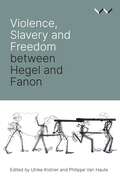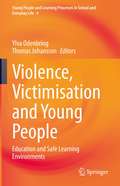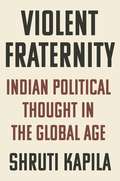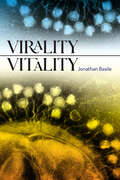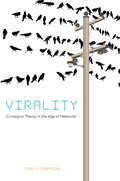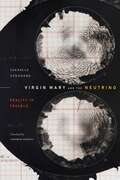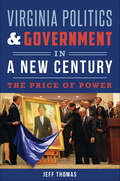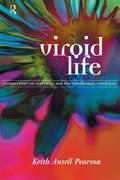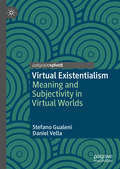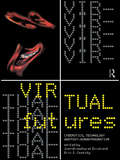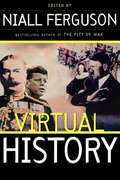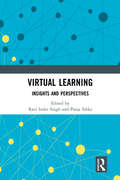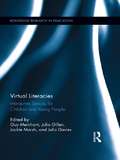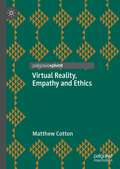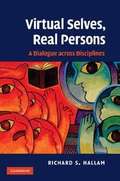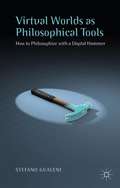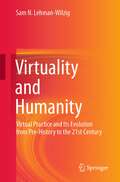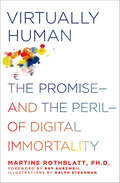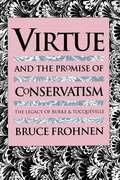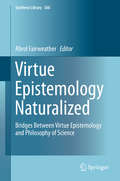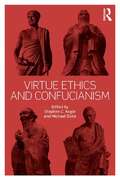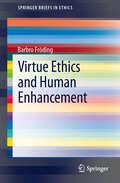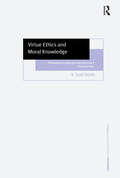- Table View
- List View
Violence, Slavery and Freedom between Hegel and Fanon
by Ulrike Kistner Philippe Van Haute Robert Bernasconi Ato Sekyi-Otu Josias Tembo Beata Stawarska Reingard NethersoleA deep dive into the influences of Hegelian thought on the work of revolutionary and postcolonial theorist Frantz FanonHegel is most often mentioned – and not without good reason – as one of the paradigmatic exponents of Eurocentrism and racism in Western philosophy. But his thought also played a crucial and formative role in the work of one of the iconic thinkers of the ‘decolonial turn’, Frantz Fanon. This would be inexplicable if it were not for the much-quoted ‘lord-bondsman’ dialectic – frequently referred to as the ‘master-slave dialectic’ – described in Hegel's The Phenomenology of Spirit. Fanon takes up this dialectic negatively in contexts of violence-riven (post-)slavery and colonialism; yet in works such as Black Skin, White Masks and The Wretched of the Earth he upholds a Hegelian-inspired vision of freedom.The essays in this collection offer close readings of Hegel’s text, and of responses to it in the work of twentieth-century philosophers, that highlight the entangled history of the translations, transpositions and transformations of Hegel in the work of Fanon, and more generally in colonial, postcolonial and decolonial contexts.
Violence, Victimisation and Young People: Education and Safe Learning Environments (Young People and Learning Processes in School and Everyday Life #4)
by Thomas Johansson Ylva OdenbringThis edited collection focuses on different aspects of everyday violence, harassment and threats in schools. It presents a number of in-depth studies of everyday life in schools and uses examples and case studies from different countries to fuel a discussion on national differences and similarities. The book discusses a broad range of concepts, findings and issues, under the umbrella of three main themes: 1) Power relations, homosociality and violence; 2) Sexualized violence and schooling; and 3) Everyday racism, segregation and schooling. Specific topics include sexuality policing, bullying, sexting, homophobia, and online rape culture. The school is young people’s central workplace, and therefore of great importance to students’ general feeling of wellbeing, safety and security. However, there is no place where youth are at greater risk of being exposed to harassment and violations than at school and on their way to and from school. Threats are a relatively common experience among school students, but some aspects of these mundane and frequent harassments and violations are not taken seriously and are, therefore, not reported. Harassment and violations often have negative effects on youth and children, and increase their risks of such adverse outcomes as school dropout, drug use, and criminal behaviour. Contemporary research has shown that gender is of great importance to how students handle and report, or do not report, various violent situations. Studies have also revealed how the notions of masculinity and of being a victim can be conflicting identities and affect how students handle situations of threat, violence and harassment. The importance of gender is also particularly evident with regard to sexual harassment. Female students generally report greater exposure to sexual harassment than male students do.
Violent Fraternity: Indian Political Thought in the Global Age
by Shruti KapilaA groundbreaking history of the political ideas that made modern IndiaViolent Fraternity is a major history of the political thought that laid the foundations of modern India. Taking readers from the dawn of the twentieth century to the independence of India and formation of Pakistan in 1947, the book is a testament to the power of ideas to drive historical transformation.Shruti Kapila sheds new light on leading figures such as M. K. Gandhi, Muhammad Iqbal, B. R. Ambedkar, and Vinayak Savarkar, the founder of Hindutva, showing how they were innovative political thinkers as well as influential political actors. She also examines lesser-known figures who contributed to the making of a new canon of political thought, such as B. G. Tilak, considered by Lenin to be the "fountainhead of revolution in Asia," and Sardar Patel, India's first deputy prime minister. Kapila argues that it was in India that modern political languages were remade through a revolution that defied fidelity to any exclusive ideology. The book shows how the foundational questions of politics were addressed in the shadow of imperialism to create both a sovereign India and the world's first avowedly Muslim nation, Pakistan. Fraternity was lost only to be found again in violence as the Indian age signaled the emergence of intimate enmity.A compelling work of scholarship, Violent Fraternity demonstrates why India, with its breathtaking scale and diversity, redefined the nature of political violence for the modern global era.
Violent London
by Clive BloomAlmost as soon as it was built, London suffered the first of many acts of violent protest, when Boudica and her followers set fire to the city in AD 60. Ever since, the capital's streets have been a forum for popular insurrection. Covering nearly 2,000 years of political protest, this is a riveting alternative history of past and present conflict.
Virality Vitality (SUNY series in Contemporary French Thought)
by Jonathan BasileReveals the fragility of basic scientific concepts through the unstable relationship between viruses and life, calling for a deconstructive reading to grapple with their theoretical and political effects.Virality Vitality explores the history and present of the life sciences and virology, focusing on moments of disruption that reveal the instability of the most basic concepts guiding scientific knowledge and their practical or political consequences. From their "discovery" to present-day experiments in synthetic virology, viruses have given rise to upheavals in our models of life because of the difficulty of rigorously distinguishing life from virus, self from other. The virus has been compared to a gene, to an agent of life's heredity and immunity, and we humans depend on the fossils of ancient viral infections in our genome in order to bear children. Can a parasite give birth to its host? To interpret the nonoppositional relationship of virality and vitality, this book draws on the work of Jacques Derrida and the growing field of biodeconstruction that has emerged from his posthumously published work on genetics. In turn, Virality Vitality suggests a novel approach to questions of the agency of "matter" or the "nonhuman," often raised in Anthropocene studies, the material turn, and ecocriticism. Nothing is more natural than the artificiality of the borders drawn, maintained, and displaced by the living and their viruses, by virality-vitality. The inscription of these borders remains to be read, and thus deconstructive textuality is anything but opposed to the sciences and what they call life.
Virality: Contagion Theory in the Age of Networks
by Tony D. SampsonIn this thought-provoking work, Tony D. Sampson presents a contagion theory fit for the age of networks. Unlike memes and microbial contagions, Virality does not restrict itself to biological analogies and medical metaphors. It instead points toward a theory of contagious assemblages, events, and affects. For Sampson, contagion is not necessarily a positive or negative force of encounter; it is how society comes together and relates.Sampson argues that a biological knowledge of contagion has been universally distributed by way of the rhetoric of fear used in the antivirus industry and other popular discourses surrounding network culture. This awareness is also detectable in concerns over too much connectivity, such as problems of global financial crisis and terrorism. Sampson&’s &“virality&” is as established as that of the biological meme and microbe but is not understood through representational thinking expressed in metaphors and analogies. Rather, Sampson interprets contagion theory through the social relationalities first established in Gabriel Tarde&’s microsociology and subsequently recognized in Gilles Deleuze&’s ontological worldview.According to Sampson, the reliance on representational thinking to explain the social behavior of networking—including that engaged in by nonhumans such as computers—allows language to overcategorize and limit analysis by imposing identities, oppositions, and resemblances on contagious phenomena. It is the power of these categories that impinges on social and cultural domains. Assemblage theory, on the other hand, is all about relationality and encounter, helping us to understand the viral as a positively sociological event, building from the molecular outward, long before it becomes biological.
Virgin Mary and the Neutrino: Reality in Trouble (Experimental Futures)
by Isabelle StengersIn Virgin Mary and the Neutrino, first published in French in 2006 and here appearing in English for the first time, Isabelle Stengers experiments with the possibility of addressing modern practices not as a block but through their divergence from each other. Drawing on thinkers ranging from John Dewey to Gilles Deleuze, she develops what she calls an “ecology of practices” into a capacious and heterogeneous perspective that is inclusive of cultural and political forces but not reducible to them. Stengers first advocates for an approach to sciences that would emphasize the way each should be situated by the kind of relationships demanded by what it attempts to address. This approach turns away from the disabling scientific/nonscientific binary—like the opposition between the neutrino and the Virgin Mary. An ecology of practices instead stimulates an appetite for thinking reality not as an arbiter but as what we can relate to through the generation of diverging concerns and obligations.
Virginia Politics & Government in a New Century: The Price of Power
by Jeff ThomasThe modern political landscape of Virginia bears little resemblance to the past. The commonwealth is a nationally influential swing state alongside stalwarts like Florida or Ohio. But with increased power comes greater scrutiny--and corruption. Governor Bob McDonnell received a jail sentence on federal corruption charges, later vacated by the U.S. Supreme Court. Corporate influence on the state legislature and other leaders resulted in numerous ethics violations. Scandal erupted at the prestigious University of Virginia when the school ousted its president amid political drama and intrigue. Author Jeff Thomas reveals the intersection of money, power and politics and the corrosive effect on government in a new era.
Viroid Life: Perspectives on Nietzsche and the Transhuman Condition
by Keith Ansell PearsonNietzsche's vision of the 'overman' continues to haunt the postmodern imagination. His call that 'man is something that must be overcome' can no longer be seen as simple rhetoric. Our experiences of the hybrid realities of artificial life have made the 'transhuman' a figure that looks over us all. Inspired by this vision, Keith Ansell Pearson sets out to examine if evolution is 'out of control' and machines are taking over.In a series of six fascinating perspectives, he links Nietzsche's thought with the issues at stake in contemporary conceptions of evolution from the biological to the technological. Viroid Life; Perspectives on Nietzsche and the Transhuman Condition considers the hybrid, 'inhuman' character of our future with the aid of Nietzsche's philosophy. Keith Ansell Pearson contrasts Nietzsche and Darwin before introducing the more recent figures such as Giles Deleuze and Guy Debord to sketch a new thinking of technics and machines and stress the ambiguous character of our 'machine enslavement'.
Virtual Existentialism: Meaning and Subjectivity in Virtual Worlds
by Stefano Gualeni Daniel VellaThis book explores what it means to exist in virtual worlds. Chiefly drawing on the philosophical traditions of existentialism, it articulates the idea that — by means of our technical equipment and coordinated practices — human beings disclose contexts or worlds in which they can perceive, feel, act, and think. More specifically, this book discusses how virtual worlds allow human beings to take new perspectives on their values and beliefs, and explore previously unexperienced ways of being. Virtual Existentialism will be useful for scholars working in the fields of philosophy, anthropology, media studies, and digital game studies.
Virtual Futures: Cyberotics, Technology and Posthuman Pragmatism
by Joan Broadhurst Dixon Eric J. CassidyVirtual Futures explores the ideas that the future lies in its ability to articulate the consequences of an increasingly synthetic and virtual world. New technologies like cyberspace, the internet, and Chaos theory are often discussed in the context of technology and its potential to liberate or in terms of technophobia. This collection examines both these ideas while also charting a new and controversial route through contemporary discourses on technology; a path that discusses the material evolution and the erotic relation between humans and machines. Virtual Futures brings together diverse fields such as cyberfeminism, materialist philosophy, postmodern fiction, computing culture and performance art, with essays by Sadie Plant, Stelarc and Manuel de Landa (to name a few). The collection heralds the death of humanism and the ride of posthuman pragmatism. The contested zone of debate throughout these essays is the notion of the posthuman, or the possibility of the cyborg as the free human. Viewed by some writers as a threat to human life and humanism itself, others in the collection describe the posthuman as a critical perspective that anticipates the next step in evolution: the integration or synthesis of humans and machines, organic life and technology. This view of technology and information is heavily influenced by Anglo American literature, especially cyberpunk, Pynchon and Ballard, as well as the materialist philosophies of Freud, Deleuze, and Haraway, Virtual Futures provides analyses by both established theorists and the most innovative new voices working in conjunction between the arts and contemporary technology.
Virtual History: Alternatives and Counterfactuals
by Niall FergusonWhat if there had been no American War of Independence? What if Kennedy had lived? These are some of the questions "answered" in "Virtual History", which provides intriguing, far-reaching answers to these questions.
Virtual Learning: Insights and Perspectives
by Ravi Inder Singh Pooja SikkaThis book brings together the research work conducted by renowned academics and practitioners on critical and immensely important issues of virtual learning. It provides innovative ideas and empirical findings on the subject. The sixteen chapters by established and young scholars from all over the country offer strong theoretical and analytical discussion, and examine a wide range of issues confronting the education sector in India in general and the higher education sector in particular. The book seeks to address pertinent issues relating to virtual learning like emerging scenario with respect to required changes in pedagogy used in higher education learning, perceptions of learners about online mode of learning, problems and challenges in virtual learning, paradigm shifts in higher education, designing of new learning strategies for online mode of learning and about the role virtual learning plays in inclusive growth. The scholarly discussion of the book will serve as an excellent vade mecum for readers who want to understand the various dimensions of virtual learning, specifically those that emerged during the Covid-19 Pandemic period, and will provide opportunities to researchers to use it as reference to pursue research in the field of virtual learning.
Virtual Literacies: Interactive Spaces for Children and Young People (Routledge Research in Education #84)
by Julia Gillen Jackie Marsh Guy Merchant Julia DaviesThe growth of interest in virtual worlds and other online spaces for children and young people raises important issues for literacy educators and researchers. This book is a timely and much-needed collection of current research in the area. It provides a synthesis of knowledge and understanding and will be a key resource for scholars, students and teachers, particularly those interested in digital literacies. The work presents a coherent vision of current knowledge, and some of the most engaging, empirical research being undertaken on virtual worlds and online spaces in and beyond educational institutions. It contains international studies from the UK, North America and Australasia. This is an important time for those researching virtual worlds, videogaming and Web 2.0 technologies, since there is growing professional interest in their significance in the education and development of children and young people. Whether these technologies are solely associated with informal learning or whether they should be incorporated into classroom contexts is hotly debated. This book provides a principled evaluation and appreciation of the learning, teaching and instruction that can occur in digital environments, showing children, young people and those who work with them as active agents with possibilities to navigate new paths.
Virtual Reality, Empathy and Ethics
by Matthew CottonThis book examines the ethics of virtual reality (VR) technologies. New forms of virtual reality are emerging in society, not just from low-cost gaming headsets, or augmented reality apps on phones, but from simulated “deep fake” images and videos on social media. This book subjects the new VR technological landscape to ethical scrutiny: assessing the benefits, risks and regulatory practices that shape it. Though often associated with gaming, education and therapy, VR can also be used for moral enhancement. Journalists, artists, philanthropic and non-governmental organisations are using VR films, games and installations to stimulate user empathy to marginalised peoples through a combination of immersion, embodiment and persuasion. This book critically assesses the use of VR for empathy arousal and pro-social behaviour change, culminating in the development of a VR “ethical tool” – a device to facilitate reflective ethical judgement. Drawing upon the pragmatist philosophy of John Dewey, virtual reality is reshaped as “dramatic rehearsal”. This book explains how a combination of immersive environment-building, moral imagination, choice architecture and reflective engagement can stimulate a future-focused and empathic ethics for users of the technology.
Virtual Selves, Real Persons
by Richard S. HallamHow do we know and understand who we really are as human beings? The concept of 'the self' is central to many strands of psychology and philosophy. This book tackles the problem of how to define persons and selves and discusses the ways in which different disciplines, such as biology, sociology and philosophy, have dealt with this topic. Richard S. Hallam examines the notion that the idea of the self as some sort of entity is a human construction and, in effect, a virtual reality. At the same time, this virtual self is intimately related to the reality of ourselves as biological organisms. Aiming to integrate a constructionist understanding of self with the universalizing assumptions that are needed in natural-science approaches, this text is unique in its attempt to create a dialogue across academic disciplines, while retaining a consistent perspective on the problem of relating nature to culture.
Virtual Worlds As Philosophical Tools
by Stefano Gualeni• What does it mean for human beings to 'be' in simulated worlds? • Will experiencing worlds that are not 'actual' change our ways of structuring thought? • Can virtual worlds open up new possibilities to philosophize? Inspired by Martin Heidegger's work,Virtual Worlds as Philosophical Tools seeks to answer these questions from a perspective that combines insights from the field of philosophy of technology with videogame design. Gualeni's exploration casts new light on interactive digital simulations as the context in which a new humanism has already begun to arise. From that perspective, this book articulates an understanding of virtual worlds as philosophical mediators.
Virtuality and Humanity: Virtual Practice and Its Evolution from Pre-History to the 21st Century
by Sam N. Lehman-WilzigThis is a pioneering study of virtuality through human history: ancient-to-modern evolution and recent expansion; expression in many fields (chapters on Religion; Philosophy, Math, Physics; Literature and the Arts; Economics; Nationhood, Government and War; Communication); psychological and social reasons for its universality; inter-relationship with "reality." The book's thesis: virtuality was always an integral part of humanity in many areas of life, generally expanding over the ages. The reasons: 1- brain psychology; 2- virtuality's six functions — escape from boredom to relieving existential dread. Other questions addressed: How will future neuroscience, biotech and "compunications" affect virtuality? Can/should there be limits to human virtualizing?
Virtually Human: The Promise—and the Peril—of Digital Immortality
by Martine RothblattVirtually Human explores what the not-too-distant future will look like when cyberconsciousness—simulation of the human brain via software and computer technology—allows our consciousness to be present forever.Meet Bina48, the world's most sentient robot, commissioned by Martine Rothblatt and created by Hanson Robotics. Bina48 is a nascent Mindclone of Martine's wife that can engage in conversation, answer questions, and even have spontaneous thoughts that are derived from multimedia data in a Mindfile created by the real Bina. If you're active on Twitter or Facebook, share photos through Instagram, or blogging regularly, you're already on your way to creating a Mindfile—a digital database of your thoughts, memories, feelings, and opinions that is essentially a back-up copy of your mind. Soon, this Mindfile can be made conscious with special software—Mindware—that mimics the way human brains organize information, create emotions and achieve self-awareness. This may sound like science-fiction A.I. (artificial intelligence), but the nascent technology already exists. Thousands of software engineers across the globe are working to create cyberconsciousness based on human consciousness and the Obama administration recently announced plans to invest in a decade-long Brain Activity Map project. Virtually Human is the only book to examine the ethical issues relating to cyberconsciousness and Rothblatt, with a Ph.D. in medical ethics, is uniquely qualified to lead the dialogue.
Virtue And The Promise Of Conservatism: The Legacy Of Burke And Tocqueville
by Bruce FrohnenOften loud and acrimonious, the public tug-of-war between a reinvigorated conservatism and a liberalism in apparent disarray has obscured an equally important competition-that among conservatives themselves. <p><p> In Virtue and the Promise of Conservatism, Bruce Frohnen joins the fray in an effort to rescue the essence of conservative virtue from rationalists and materialists of whatever political stripe. He argues that we have "lost and must attempt to regain the conservative good life and the outlook which made it possible." The tools needed to do that, according to Frohnen, are humility and—yes—political action aimed at combatting the centralizing and materialistic structures and beliefs interfering with the formation and retention of family, church, and neighborhood. <p> Drawing deeply from the writings of Edmund Burke and Alexis de Tocqueville, both critics of untempered reason and "the drive toward a spiritually impoverished egalitarian materialism," Frohnen explores how their work has influenced individuals as diverse as traditionalist Russell Kirk, "apocalyptic" libertarian Michael Oakeshott, and neoconservative Irving Kristol. <p> While differing greatly in their views and prescriptions, these contemporary conservatives, Frohnen shows, are nevertheless united in their desire to preserve the local community's natural and fundamental institutions. This preservation, he argues, requires a renewed faith in and humble acceptance of the essential good contained within these institutions.
Virtue Epistemology Naturalized
by Abrol FairweatherThis book presents four bridges connecting work in virtue epistemology and work in philosophy of science (broadly construed) that may serve as catalysts for the further development of naturalized virtue epistemology. These bridges are: empirically informed theories of epistemic virtue; virtue theoretic solutions to under determination; epistemic virtues in the history of science; and the value of understanding. Virtue epistemology has opened many new areas of inquiry in contemporary epistemology including: epistemic agency, the role of motivations and emotions in epistemology, the nature of abilities, skills and competences, wisdom and curiosity. Value driven epistemic inquiry has become quite complex and there is a need for a responsible and rigorous process of constructing naturalized theories of epistemic virtue. This volume makes the involvement of the sciences more explicit and looks at the empirical aspect of virtue epistemology. Concerns about virtue epistemology are considered in the essays contained here, including the question: can any virtue epistemology meet both the normativity constraint and the empirical constraint? The volume suggests that these worries should not be seen as impediments but rather as useful constraints and desiderata to guide the construction of naturalized theories of epistemic virtue.
Virtue Epistemology Naturalized: Bridges Between Virtue Epistemology and Philosophy of Science (Synthese Library #366)
by Abrol FairweatherThis book presents four bridges connecting work in virtue epistemology and work in philosophy of science (broadly construed) that may serve as catalysts for the further development of naturalized virtue epistemology. These bridges are: empirically informed theories of epistemic virtue; virtue theoretic solutions to under determination; epistemic virtues in the history of science; and the value of understanding.Virtue epistemology has opened many new areas of inquiry in contemporary epistemology including: epistemic agency, the role of motivations and emotions in epistemology, the nature of abilities, skills and competences, wisdom and curiosity.Value driven epistemic inquiry has become quite complex and there is a need for a responsible and rigorous process of constructing naturalized theories of epistemic virtue. This volume makes the involvement of the sciences more explicit and looks at the empirical aspect of virtue epistemology.Concerns about virtue epistemology are considered in the essays contained here, including the question: can any virtue epistemology meet both the normativity constraint and the empirical constraint? The volume suggests that these worries should not be seen as impediments but rather as useful constraints and desiderata to guide the construction of naturalized theories of epistemic virtue.
Virtue Ethics and Confucianism
by Stephen C. Angle Michael SloteThis volume presents the fruits of an extended dialogue among American and Chinese philosophers concerning the relations between virtue ethics and the Confucian tradition. Based on recent advances in English-language scholarship on and translation of Confucian philosophy, the book demonstrates that cross-tradition stimulus, challenge, and learning are now eminently possible. Anyone interested in the role of virtue in contemporary moral philosophy, in Chinese thought, or in the future possibilities for cross-tradition philosophizing will find much to engage with in the twenty essays collected here.
Virtue Ethics and Human Enhancement
by Barbro FrödingThis book shows how pressing issues in bioethics - e.g. the ownership of biological material and human cognitive enhancement - successfully can be discussed with in a virtue ethics framework. This is not intended as a complete or exegetic account of virtue ethics. Rather, the aim here is to discuss how some key ideas in Aristotle's Nicomachean Ethics, when interpreted pragmatically, can be a productive way to approach some hot issues in bioethics. In spite of being a very promising theoretical perspective virtue ethics has so far been underdeveloped both in bioethics and neuroethics and most discussions have been conducted in consequentialist and/or deontological terms.
Virtue Ethics and Moral Knowledge: Philosophy of Language after MacIntyre and Hauerwas (Ashgate New Critical Thinking in Philosophy)
by R. Scott SmithWe live in a time of moral confusion: many believe there are no overarching moral norms, and we have lost an accepted body of moral knowledge. Alasdair MacIntyre addresses this problem in his much-heralded restatement of Aristotelian and Thomistic virtue ethics; Stanley Hauerwas does so through his highly influential work in Christian ethics. Both recast virtue ethics in light of their interpretations of the later Wittgenstein's views of language. This book systematically assesses the underlying presuppositions of MacIntyre and Hauerwas, finding that their attempts to secure moral knowledge and restate virtue ethics, both philosophical and theological, fail. Scott Smith proposes alternative indications as to how we can secure moral knowledge, and how we should proceed in virtue ethics.
